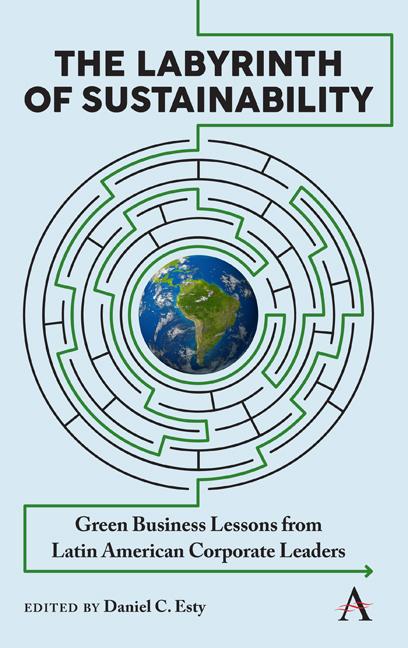Book contents
- Frontmatter
- Dedication
- Contents
- List of Illustrations
- Acknowledgments
- Notes on Contributors
- Introduction
- Chapter 1 Water Conservation in Scarcity Conditions: Corporate Sustainability at Mexico's FEMSA Group
- Chapter 2 Walmart Mexico: Clean Energy to Reduce Costs and Improve Corporate Image
- Chapter 3 Grupo Vanguardia Revitalizes Plastics Recycling in Honduras
- Chapter 4 Nissan Mexicana's Renewable Power Partnership
- Chapter 5 Tecnosol Follows the Sun
- Chapter 6 Rizek Pushes the Dominican Republic Cocoa Industry toward Sustainability
- Chapter 7 Centrosur Leads the Way to Sustainability in Ecuador
- Chapter 8 A Resilient World: Bavaria Builds Its Case on Water
- Chapter 9 Grupo Herdez Takes the Initiative in Mexico's Food Market
- Chapter 10 Chile's Las Palmas Avocado Orchard: Water Consumption Reduction in Agriculture
- Chapter 11 Mabesa: Increasing Global Competitiveness with Eco-friendly Disposable Products
- Chapter 12 Water Use Efficiency Initiatives in Nestlé's Value Chain and the Implications of the Company's Business Model
- Notes
- Index
Chapter 5 - Tecnosol Follows the Sun
Published online by Cambridge University Press: 29 May 2019
- Frontmatter
- Dedication
- Contents
- List of Illustrations
- Acknowledgments
- Notes on Contributors
- Introduction
- Chapter 1 Water Conservation in Scarcity Conditions: Corporate Sustainability at Mexico's FEMSA Group
- Chapter 2 Walmart Mexico: Clean Energy to Reduce Costs and Improve Corporate Image
- Chapter 3 Grupo Vanguardia Revitalizes Plastics Recycling in Honduras
- Chapter 4 Nissan Mexicana's Renewable Power Partnership
- Chapter 5 Tecnosol Follows the Sun
- Chapter 6 Rizek Pushes the Dominican Republic Cocoa Industry toward Sustainability
- Chapter 7 Centrosur Leads the Way to Sustainability in Ecuador
- Chapter 8 A Resilient World: Bavaria Builds Its Case on Water
- Chapter 9 Grupo Herdez Takes the Initiative in Mexico's Food Market
- Chapter 10 Chile's Las Palmas Avocado Orchard: Water Consumption Reduction in Agriculture
- Chapter 11 Mabesa: Increasing Global Competitiveness with Eco-friendly Disposable Products
- Chapter 12 Water Use Efficiency Initiatives in Nestlé's Value Chain and the Implications of the Company's Business Model
- Notes
- Index
Summary
Abstract
Tecnosol is a solar power company founded in Nicaragua in 1998, which now has twenty-one branches throughout Central America. The company has profitably responded to the high demand for electricity in a rural region suffering from energy poverty, and has brought electricity to over 500,000 Central Americans. It has pioneered the use of microcredit to offer quality solar products to customers in rural areas who would otherwise not be able to afford them. Tecnosol then follows up on each purchase by teaching customers how to maintain their solar products so that their investment pays for itself quickly. This chapter chronicles Tecnosol's founding in the aftermath of the Nicaraguan civil war and analyzes its expansion throughout Central America. It then breaks down how Tecnosol attains results measurable at the triple bottom line— economic, environmental, social— demonstrating how sustainability can be a profitable business strategy, even in communities with low purchasing power.
Introduction
Tecnosol, a solar power company in Nicaragua, was founded in 1998 by Vladimir Delagneau, a Nicaraguan soldier who learned about solar power during the country's civil war in the 1980s. In founding Tecnosol, Delagneau was able to transcend the limitations of state regulations, contribute to Nicaragua's socioeconomic development, and enhance environmental protection. Driven by its founder's commitment to sustainability, Tecnosol has responded to an untapped market for clean energy in northern Nicaragua. By continually updating its position in the solar power field, the company has expanded; it now has 21 branches, covering rural and urban markets in Nicaragua and throughout Central America.
Tecnosol's success shows it is possible to do profitable business in a region characterized by energy and fuel scarcity. By selling and installing solar panels, Tecnosol offers customers in Central America an off-the-grid, environmentally friendly energy solution, transforming the quality of life and economic productivity of rural residents. Today, the renewable energy company continues to operate successfully in areas where access to electricity is limited and power is expensive, as well as areas that lack institutional frameworks to encourage clean energy. Not limited to rural markets, however, Tecnosol has also brought clean energy to the urban market, where electricity is even more expensive and environmentally destructive.
- Type
- Chapter
- Information
- The Labyrinth of SustainabilityGreen Business Lessons from Latin American Corporate Leaders, pp. 61 - 80Publisher: Anthem PressPrint publication year: 2019

